An Interview with Jaan Uhelszki on her book MC5: An Oral Biography of Rock’s Most Revolutionary Band
Manuscripts don’t burn.
-Mikhail Bulgakov, The Master and Margarita
Last April journalist, author, and former CREEM magazine editor Susan Whitall came to Book Beat and called her friend and former CREEM colleague Jaan Uhelszki to discuss a signing event for her MC5 book coming out in the fall. Her MC5 biography was based on a decade of interviews made by rock writer Ben Edmonds over 30 years ago. Uhelszki supplemented that material with her own MC5 interviews. Present during the call were Jaan Uhelszki, Susan Whitall, and Cary Loren. We later talked with photographer Leni Sinclair who filled in some gaps on the MC5 spiritual guide Rev. Jesse Crawford and the band’s Rock Hall of Fame induction on October 19.
[Note: A book talk and signing with Jaan Uhelszki and co-author Brad Tolinski will be held at Book Beat on Sunday, October 13 from 3-5 pm. Preorders for signed books can be made online now at the Book Beat Gallery.]
CL: How were Ben’s files kept? Were they organized?
JU: Oh my god! No! It was handwritten transcripts. Like years and years of tape recordings just written down on regular yellow sheet legal pads. It was too soon after Ben died, so Mary wouldn’t let me take them home. And I got that. She scanned probably 1000 pages. And then my transcriber turned them into text, so my co-writer Brad Tolinski and I could move them around and play with it.
CL: Could you read Ben’s writing easily?
JU: Yeah, he was very anal, very neat. The neatest man I ever knew.
SW: Yeah, yeah. The white worm.
CL: Snazzy dresser too.
JU: Oh, my God, really. He looked like the missing Beach Boy, but with better hair. He always had perfect hair. What Ben didn’t have, I took from some of the interviews that I had done with the Five over the years, and stuck it in when something was missing. The one thing we didn’t have was Fred. We have people talking about Fred, but that’s the only missing part. We thought we might get Patti to write an intro, to speak for him, but it’s almost the 11th hour—the book comes out in October—so it doesn’t look like that is going to happen.
SW: Oh, you mean there’s still time you could get it in?
JU: Yeah. We’ve written her a few times, we haven’t heard anything back.
SW: It was hard to draw Fred out by the time I knew him. Maybe it always was. Although he was always up for talking about his kids, and showing off their pictures.
CL: He was often short on words.
JU: You could say Fred’s actions spoke louder than his words. But the truth was, he didn’t really speak that much. All he had to do was fix you with THAT look. I wasn’t doing interviews when I met the MC5. I was barely a journalist. And at CREEM we had beats, really. Bands we loved or hated. That was Dave Marsh’s beat at CREEM so I couldn’t get near it. I had to fight for space anyway I could. Sue and I both did. Back in those early days I was just like the cleanup woman as Sue will tell you. I’d take the stories nobody else wanted just to be able to write.
CL: So all the categories, events and chapters had to be organized by you, right?
SW: It’s an oral history.
CL: It’s an oral history, but you still had to make a chronology. You had to figure everything out. That must have been difficult.
JU: It was. But it was the fun part because it was like writing a play and fitting all the parts and voices together. They’re all such big characters, then you have them contradicting themselves a lot, and each other. I loved that part of the process. Even though it took me longer than I wanted. Brad and I did it over the whole summer of 2019.
CL: I can’t wait to read it. I saw Becky Derminer yesterday. She was at the funeral service for John Sinclair.
JU: Oh yeah, the family viewing.
CL: She was sitting behind me and I asked her, “Did you get a peek at the book yet?” And she smiled, winked, and said, “yeah, it’s terrific!”
JU: Oh my God, she and Rob were the hero and heroine in the book. They have all the best lines. Maybe because they were the closest to Ben.
CL: And Rob was kind of the intellect of the band, right?
JU: Oh yeah, absolutely. Ben even moved in their house with them in 1990 to do this. I think what’s so key about the interviews Ben did was Rob decided to break the code of silence within the MC5, and tell every truth.
CL: Holy…
JU: Wayne was a little combative and that makes for a good drama. I filled in some of the Wayne gaps that Ben didn’t have and I had a bunch of Michael’s interviews so I added those. Ben had superior Dennis interviews. Dennis was such a great no-holds barred interview. Always better than he thought he was.
CL: Right. Yeah. He’s level-headed most of the time and even a bit over-emotional.
SW: How is Dennis’s health? Is he OK? [Note: Dennis Thompson died on May 9, 2024 about one month after our interview]
JU: Becky seems to think he needs somebody to care for him. She goes and checks in on him a lot like Mama Bear. And that’s just started, that she’s just broken through that. Because she thinks she needs to. And you know, they always say we all have contracts with people. And you know, she strangely has a contract with Dennis.
SW: Yeah, yeah.
JU: I’m glad, because I really like Dennis. I mean, I like all of them.
SW: I do, too.
CL: Were you able to talk to Sigrid Dobat [Fred Smith’s first wife] at all?
JU: No, no never. She was my friend, but honestly she wouldn’t participate at all. It’s funny because she was so good in the movie.
CL: She’s really a sweet person. She has so much history with the MC5 too.
SW: And Fred’s kids are so into his legacy. It’s too bad they can’t talk Patti into something.
CL: So did Ben ever connect with Sigrid?
JU: No. There’s absolutely nothing. He talked a lot to Chris Hovanian [Wayne’s girlfriend during the ‘70s].
CL: I guess she’s holding on to her own stories.
JU: She took him with her, you know? I mean, maybe that’s the biggest revenge. That his legacy died more with Sigrid because the Patti legacy isn’t the Fred that we know. [Note: Sigrid Dobat first wife of Fred Smith died July 31, 2023]
CL: It will be fun to do an event here when the book’s out – maybe just after the DIA signing.
JU: I would love that. Wait, aren’t you at Greenfield and 11?
CL: Between 10 and 11 mile. Right next to Street Corner Music, a great record store and the Bread Basket deli in the Lincoln Plaza.
JU: Oh, my first job was there, at the Big Boys. Yeah, that’s it. Oh, my God. That just warms my heart. I’ve not come back so much since my parents are gone. But I love it. I can’t tell you how much I love you there.
CL: I’m really anxious to see the book, it’s going to be amazing! If Becky loves it, I’m sure it’s great.
JU: Oh my gosh. She was like, honestly, the handmaiden for the book, she helped me so much. Because when I was going through all the all the interviews, there were just things I didn’t know. I wanted just to make sure I had the flow right. And I swear I bugged her so much.
CL: She was totally inside from the beginning. She was sewing their clothes every night, right?
SW: Yeah.
JU: I love Becky but we didn’t become friends until 2011. Well, the thing was, when I worked at the Grande Ballroom, we all thought the MC5 girls were so mean! Or maybe just bad ass. We were all Grande girls, but I was never friends with any of them back in the day. They were like Beatles’ wives. I did know Becky’s brother, Eddie. He rode the same bus to Southfield High that I did. But I can’t believe I missed this. Because honestly, she and I didn’t become friends until 2011.
CL: Wow.
SW: Yeah, and I became friends with her because Lester introduced me to Rob. I was friends with Rob first. And then it was only after Rob died that I got to be close with Becky.
JU: Exactly. I mean, you were friends way before me. I remember when I was doing news for Addicted to Noise, you would always tell me stuff and I would put it in my column.
SW: Yeah, yeah.
CL: Jaan, did you meet any of the MC5 Grandee groupies? The Highland Park Stompers?
JU: I knew them because I used to be the Coca-Cola girl. I used to work behind the bar. They were there all the time. They would always just come and hang out by the bar and talk about the MC5. But they weren’t really glamorous, they were regular girls, you know? They were like anti-groupies.
CL: They were tough girls, right? They’d smack you down if you said anything bad about the band. If you booed the MC5 you’d get pounded or stomped on, right?
JU: Oh yeah, I thought they were great. It was kind of a juxtaposition to all those like SRC groupies and all those really tarty looking groupies who were big snobs. I just thought it was the perfect compliment. The MC5 would even call out how great they were too, in interviews. I love that. They’re not in the book a lot. I think there’s just a small section.
CL: I love that you included them. Its something unique to the scene.
SW: Do they still have that big MC5 exhibit down in the Lincoln Park Museum or is it over?
CL: It might be partly permanent. I saw some Gary Grimshaw stuff there. And they have a piece of the Grande Ballroom hanging up – a cornerstone decoration or something.
SW: Right, it’s really cool.
CL: If there’s time, maybe you could do a signing there too.
JU: I’m going to see if I can stay a week. I’d love to.
CL: I’ll drag the books anywhere you want.
SW: He’s good at that. He just did that for me last week.
CL: That’s what I do.
SW: I don’t want to deal with the square.
CL: I don’t mind putting the hustle on for the MC5. Anytime. It’s worth it. They were vital to my youth and mental health.
JU: I know. Me too. It was like the club I belonged to.
CL: Well, I’m not sure this bookstore would exist without that influence.
JU: I think my whole career wouldn’t exist if I hadn’t been like an MC5 fanatic. Like, I can’t say I was a groupie but I was more of like a mascot.
CL: Yeah, it was a badge of honor to have the motherfucker album, you know, in high school. And have a White Panther button too, you were considered the cool…
JU: Yeah, I know, I still have my Zenta pin. I keep it in a special box I bought at the State Fair in 1968.
CL: Hey, I reprinted those.
SW: You should see this Jaan, I’ll take a picture and send it to you. He’s got them on sale here at the front desk. I’ll save you one.
JU: Are you kidding?
CL: I’ll give you one at the signing and you can wear it on your book tour.
JU: I so will. Honestly. It’s funny that I took over and finished Ben’s book. The MC5 was always Ben’s lane, it was why he moved to Detroit! So there was no way I was going to tell him I was as obsessed as he was about the MC5. But he must have known. I guess that’s how I inherited it. When I came to stay with Mary Cobra to finish the book, I remember she said, “Why would anybody want to read a book about the MC5 written by a girl? Like what does a girl know about the MC5?” I didn’t know what to say. When I came to stay with Ben and Mary, and she was tough, she scared me a little. But we’ve since become really good friends, she’s like a relative now.
SW: You and I just need a girl date, you know?
JU: Yeah. We’ll do the girl date. We got plenty of time now.
CL: Thanks Jaan.
JU: All right. Bye.
ADDENDUM July 2024 with Jaan Uhelszki
After our interview we exchanged a few questions by email and messenger. I was looking for more on how Ben Edmonds envisioned the book, if a manuscript ever exisited, and how Brad Tolinski came into the project.
JU: Ben had been working on his MC5 book for years, interviewing everyone from Danny Fields, (music biz insider who signed the MC5, Stooges and first managed the Ramones) to radio legends Dennis Frawley and Bob Rudnick, to the Stooges Ron Asheton, John and Leni Sinclair, Becky Tyner, CREEM editor Dave Marsh, the MC5 roadies and of course the band themselves. He had a roomful of banker’s boxes full of interviews, always intending to get to it, but at the same time, he was afraid if he wrote it, he would reveal long-held secrets (there were many!) and reignite old feuds and grudges. He told his friend and Third Man Record exec, Ben Blackwell, “I can’t do that book and keep everyone happy. If I put out the book the way I want it, everybody’s going to be pissed off. [So] I’m not going to do it at all.” That all changed when Edmonds was diagnosed with pancreatic cancer. He called me and asked if I would help him write the book. I went to Detroit during the summer of 2015, and spent three weeks reading everything he had on the band. Rob’s letters to his wife, how they all went through a course very much like EST, that self-empowerment training popular in the 70s, designed to help participants recognize what was holding them back in life on the advice of their post-John Sinclair manager, Ronan O’Rahilly, the infamous founder of offshore radio station Radio Caroline. Confessions of the slights, the missteps, and the triumphs, but also the moments they had wished they could have gone back and done over (NOT the Fuck Hudson’s ad!) I think Ben was envisioning a massive tome like Jimmy McDonough’s Shakey about Neil Young. Had he lived longer, we might have pulled that off. But oh so sadly, he died nine months later, making me promise that I’d finish the book for him. I couldn’t refuse. I didn’t want to. But it was such a gargantuan task, that after I got over the first stage of mourning Ben I was initially daunted. Then I realized I didn’t have to turn it into the magnum opus he wanted. I could turn it into an oral biography. I enlisted my friend Brad Tolinski, the former editor-in-chief of Guitar World, a logic and editing Ninja, and asked him to help me. We began the project in earnest in 2018 and finally finished it in November 2023.
CL: You mention Brad helped arrange the chronology in 2019 – that seems like something you already knew. I’m unsure why he was needed. It seemed like you had it under control and it was all of yours and Ben’s content.
JU: It was such a big job I felt overwhelmed. Brad’s a genius on sequencing and I knew he’d be good with that. We split the chapter intros, and I did what I was good at, he did what he was. It mostly worked out. Meaning we didn’t fight too much. Maybe most importantly he got us the deal. Our dads worked together at Fords so I figured we could work together too. I swear.
CL: That’s cool and he’s from Detroit, so that helps explain a lot. I think Ben’s worries were mostly BS – he was a weenie and chickened out.
JU: I kinda get why he chickened out. The stuff that had all that energy around it would cause pain. The myths he thought he’d have to demolish. But I think the reality of it was so daunting and he was afraid that he couldn’t do the story justice, he couldn’t tell the story he had in his head. Execution and imagination sometimes are at odds. Sadly.
CL: I love that -like an existential crisis. Which it is when you lived it as close as he did and couldn’t pull back… it was like how all these conversations about Detroit music were taking place overseas- but Detroit couldn’t talk about itself – the working-class inferiority complex? Ben must have carried a lot of guilt with the project. I’m surprised a manuscript was never found. Anyway, I’m glad the book is coming out and we can talk and honor the band’s music and Ben’s vision. MC5 fans have such a devoted fandom. One day I’d love to read your book– from the MC5 mascot POV. Confessions from the CREEM cleanup lady. The Coca-Cola girl spills the dope. That would be a hoot!
JU: I would love to write that book, I always toyed with calling it “If Thought Ballons Could Kill,” about the things I thought but didn’t say. Just haven’t. Yet.
CL: I thought it was funny how you took the high school bus with Becky’s brother.
JU: I did! He was a greaser though. That made all the difference then.
CL: I know, Poor Becky. It was the same with Sigrid. Her brother was a Nazi.
JU: I didn’t know!
CL: He was a member of Breakthrough -a violent rightwing group run by nutjob Donald Lobsinger. They attacked the Committee to End the War in Vietnam, the Fifth Estate office and firebombed the MC5’s van.
JU: Ok that is terrible for so many reasons. But it does seem directed at beautiful Sigrid. She was such an It Girl
CL: Her brother used to beat her up. He hated that she was Fred’s girlfriend and she had to move out. Becky knew all the secrets. Sigrid confided in her.
JU: She really had such a trail of tears.
Addendum II with Leni Sinclair
Leni Sinclair was interviewd by Ben Edmonds in the 90s and is quoted throughout the book. We talked by phone to clarify questions about Jesse Crawford, the Free John Sinclair Rally, and the MC5 legacy.
CL: I couldn’t figure out why Ben Edmonds never talk to Jesse Crawford, because he wasn’t that hard to find. Maybe he thought he was irrelevant. The MC5 tore into Crawford in their interviews and that seemed strange. I know you remained a friend to Jesse and thought you could explain something about him and his relationship to the MC5.
LS: We thought of Jesse as a prophet. He started the Church of Zenta religion and anybody who smoked weed was a member. The year of Zenta began on October 31, 1968 the night “Kick Out the Jams” was recorded at the Grande Ballroom. One day I’d like to ask him how he came up with the word Zenta, but I don’t think he made it up. Recently I saw a Wikipedia page about Zenta where its described as the “Battle of Zenta” – around the town of Zenta in Serbia where an uprising happened against the Ottoman empire over 300 years ago.
CL: There’s something futuristic around the idea and sound of Zenta and its association with the MC5. Maybe it will take a hundred years to figure it out.
LS: Well, Zenta to me, will become the dominant religion on the planet in a thousand years.
CL: A thousand years until utopia, that’s a long wait.
LS: It could be a utopia, with no more religion. And no more money, no hunger, no poverty. Christianity is waning and Zenta could take its place or Islam or whatever religion. They’re all bad and oppressive.
CL: We need to talk with Jesse soon and get the lowdown on Zenta.
LS: Yes, I’ll get you his number. He knows more about what’s going on in the world than anybody I know. For years he lived in isolation and depression and wouldn’t go out of his house for years. Then he called me not long ago and said he was taking the wrong medicine and so he stopped taking it and now he can talk and is lucid. It’s like a miracle.
CL: We need to hear the complete story. He was like the sixth MC5 member, right?
LS: Yes, that’s right. And that’s what I want to tell people. They ignored Jesse and he was the sixth member of the band. The band lost its focus and lost its soul after they fired Jesse—he was fired first, then they fired Bob Rudnik their number one publicist and John Sinclair. Those people from New York said they needed to get rid of Sinclair, he was too political, and you’ll never make any money with him. Jesse was the first bomb to fall.
And when you talk to people about what makes the MC5 different you just need to check their name, Motor City – nobody else but people from Detroit can make that kind of music. People from L.A. and people from New York or Europe, they don’t understand Detroit. Detroit is different. We have a Mitch Ryder, we have an Iggy, we have the MC5 and Scott Richardson. We have all kinds of great singers.
CL: for sure.
LS: And I don’t know what to say about the Rock and Roll Hall of Fame. Now that their dead, why in the world do they want to put them in the basement? They couldn’t invite them sooner? So now I’m trying to talk to someone who knows something and I want to get them to invite Jesse Crawford to the induction ceremony. The MC5’s sixth member should be there.
CL: That would be amazing! I also wanted to ask why you wanted to invite the MC5 to play the Free John Rally? —I thought that was a great reaction.
LS: John was in Jail at the time but he conspired with his brother David. They held grudges forever. For forty years John wouldn’t talk to Wayne. If the MC5 could’ve played and opened for the Beatles, they wouldn’t have fallen apart. When you think of what could’ve been if they didn’t fire John when he went to jail—and he could’ve managed them from jail which would be possible, and if they helped to get John out, man can you imagine how big they could’ve been?
CL: Sure, that would’ve changed everything.
LS: Mick Jagger said in Rolling Stone, “The only band that ever came close to what we were doing was the MC5.” I saved the clipping. But the Rolling Stones never wrote a song like “I’m Mad Like Eldridge Cleaver” or “Human Being Lawnmower.”

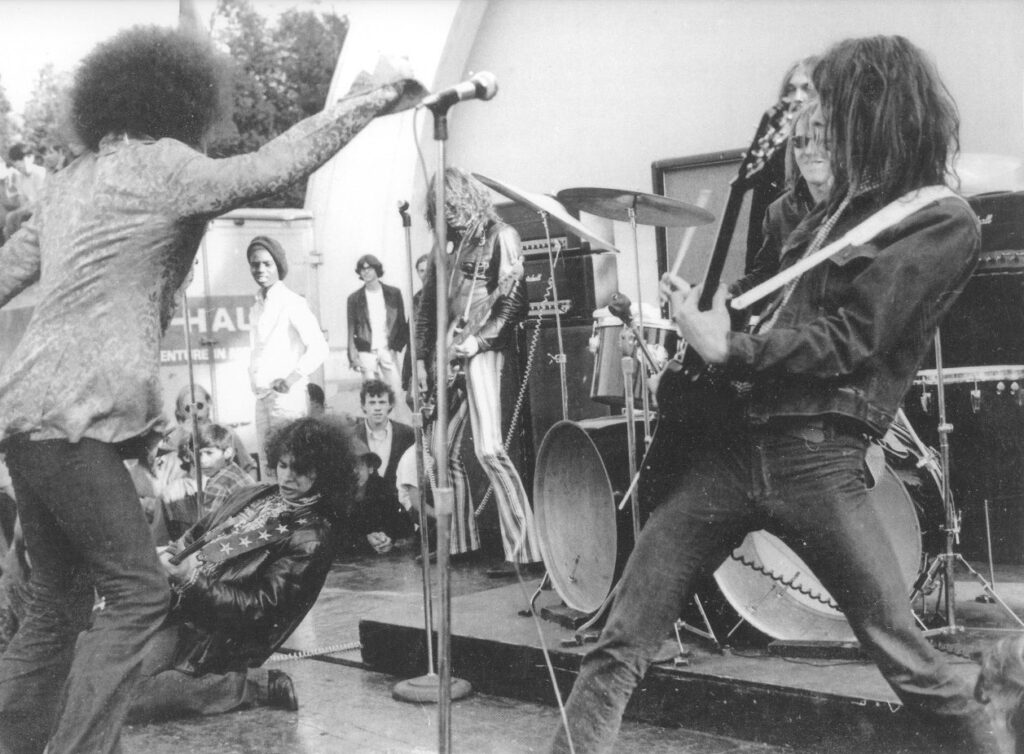
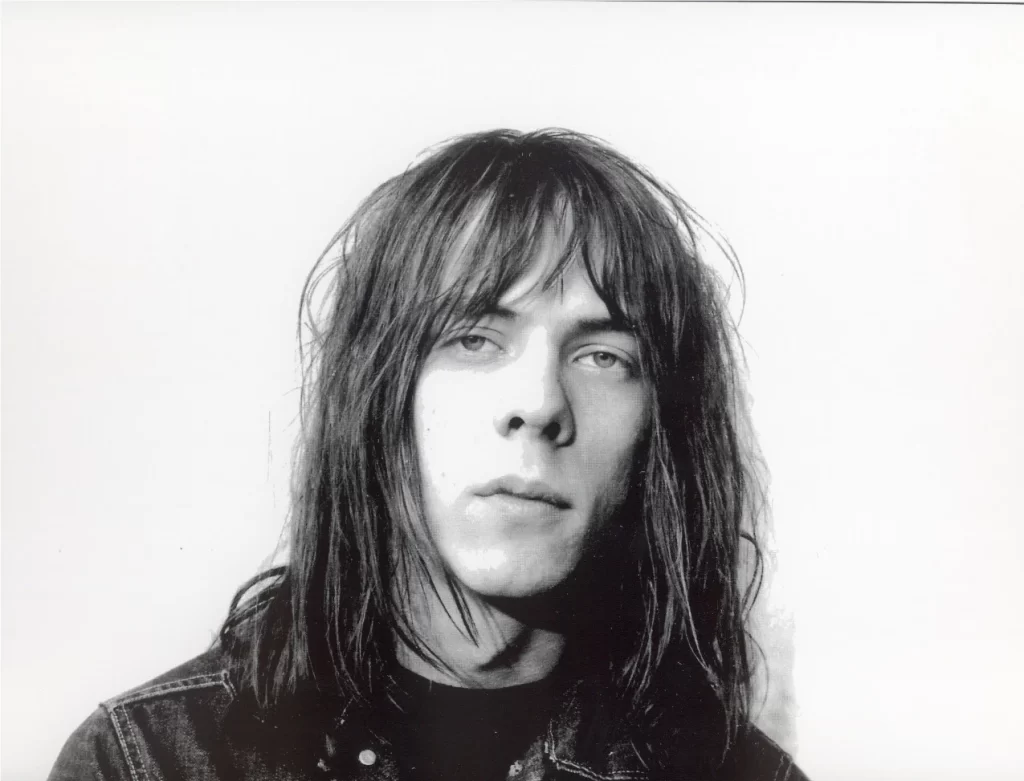
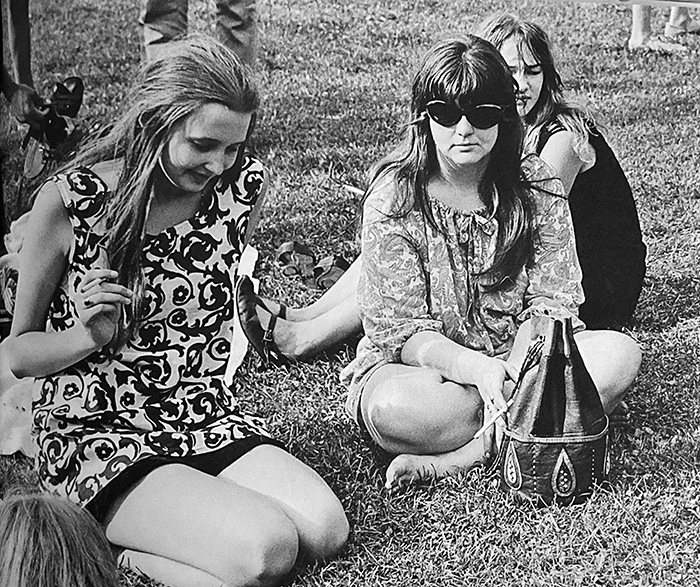
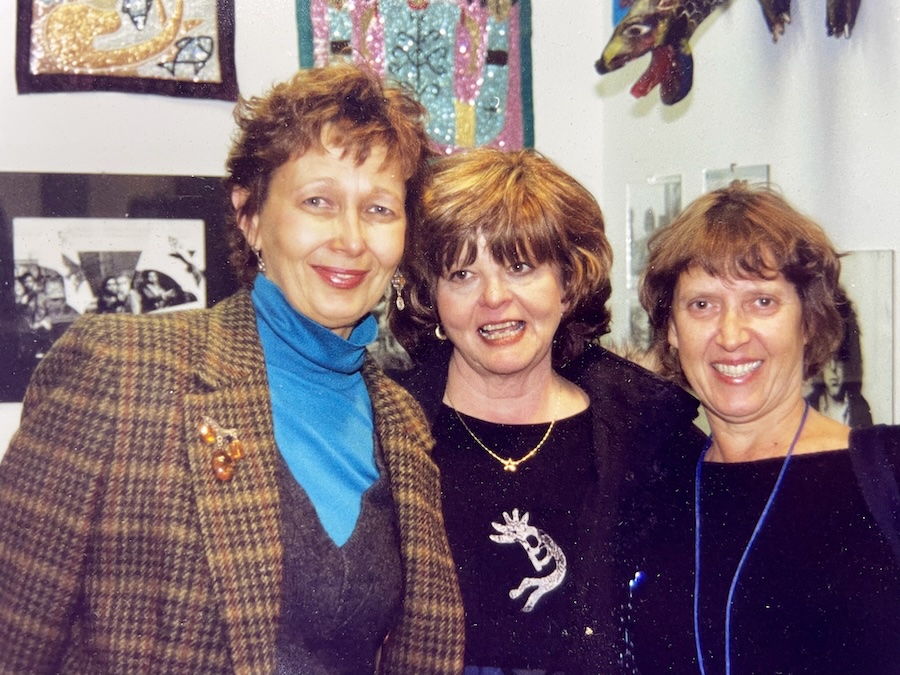
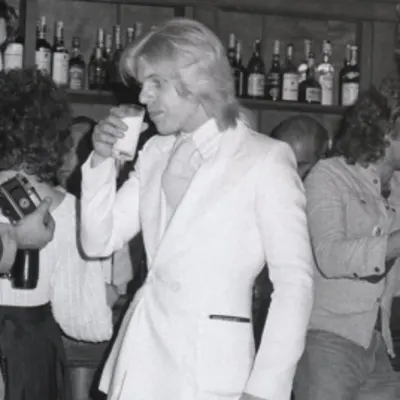

Patti never saw the MC5, as far as I know. She used to sport an MC5 button and mentioned their song “Borderline” in “Citizen Ship,” but, really, what would she have to say about them, or about Fred during a period when she didn’t even know who he was? Besides, Wayne Kramer said some nasty things about her in the book Please Kill Me. In a Metro Times interview, their son Jackson said that there was bad blood between his family and Wayne Kramer, most likely because of it. Not having been a witness to them in that era, the book is probably more true to their times sans her participation.